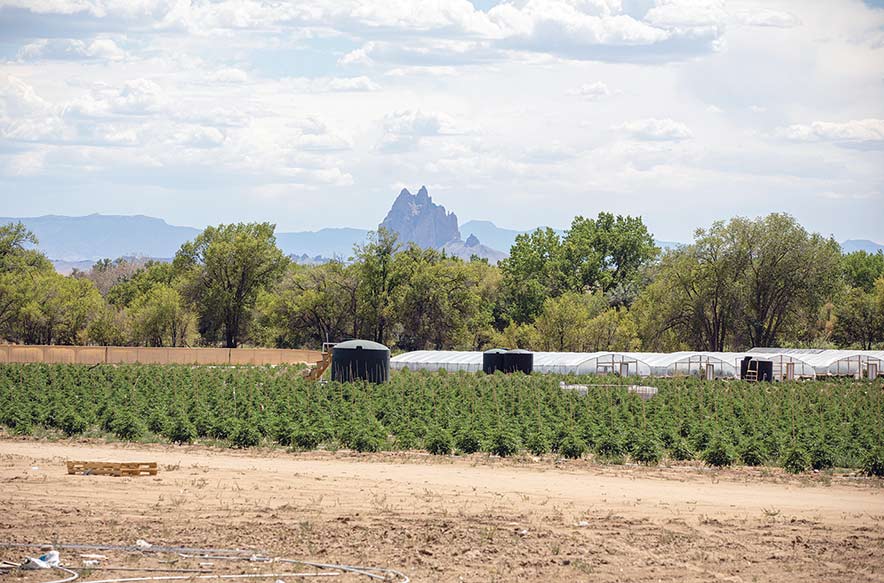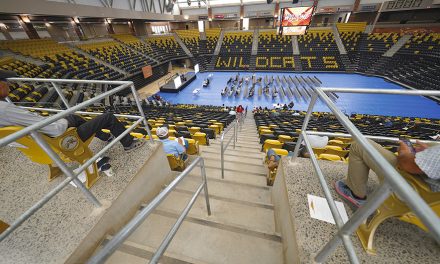
Committee hears from farm board members, BIA on hemp farms
WINDOW ROCK
Two Shiprock Farm Board members spoke against Dineh Benally’s hemp greenhouses during Wednesday’s Resource and Development Committee meeting. For most of the summer Benally’s hemp farm has been a huge issue within the Northern Navajo Agency, and the committee had requested the San Juan River Farm Board come before the committee to discuss the matter.

Navajo Times | Sharon Chischilly
Shiprock rises behind a hemp farm owned by Dineh Benally.
Only two members of the board came before the lawmakers. Benally did not call into the teleconference. The members who presented at the meeting were Tracy Raymond and Gilbert Harrison, who have been against farm board president Benally’s hemp endeavors. In July, Benally put to a vote the removal of farm board member Tracy Raymond for missing meetings and undermining the board’s decision, which passed 3-2, but Raymond says the board does not have the authority to remove one of its members.
“We do know that Mr. Benally and his company are in the process of actively cultivating hemp,” said Raymond. “The farmers, they’re against what is going on.” He continued to reinforce that community members are upset over the non-Navajo workers who are working inside these greenhouses. He said the “oriental workers” were transferred in specifically to do this job.
“The Navajos are basically out of the loop,” said Raymond. “They have no respect for Navajos. They are littering the place and have parties at all hours. In Gadiiahi there is a lot of concern.” He also informed the committee that Benally is buying out farms, and that he is subleasing farms without documentation and everything is verbal.
He also confirmed Benally has gained ownership of farms that have not been probated properly. “They are illegally drawing up water from the San Juan River,” said Raymond. “With the agreement with the state of New Mexico for the San Juan River allocation only the Navajo Nation is authorized to withdraw water from the San Juan River. Now we understand there are pumps pumping water to the greenhouses.”
Bart Stevens, director of Navajo Area BIA, said his office was made aware of the hemp situation by residents, social media, and questions from Navajo Nation officials. “We continue to get emails and voicemails,” said Stevens, “from stakeholders, community members and others that are bringing their concerns forward.”
During the San Juan River Farm Board meetings during the summer, BIA representaitves would not answer questions from community members about the hemp situation and would only say they would get information from their boss. So hearing from BIA Wednesday has been somewhat of a new phenomenon.
“BIA Natural Resources did an assessment along the San Juan River,” said Calvin Curley, also representing the BIA. “There were 21 different plots throughout four different communities and those communities are Shiprock, Gadiiahi, Hogback, San Juan chapters.”
He said through these assessments there is an estimated 400 acres of hemp production, and four of these plots require probate. One of these plots belongs to Benally, and this plot doesn’t have a land-use permit, and another farm plot doesn’t have an agriculture land-use permit.
In Hogback at least seven plots are producing hemp, as well as hoop houses. Gadiiahi Chapter has a couple of hoop houses, and within this chapter there are spots that have been identified for hemp production. San Juan Chapter has two plots according to photos taken by BIA; there has been truck action.
“The hemp operation is the most active in the Shiprock area,” said Curley. “There is a total of 10 plots growing hemp. There is also a hemp production building in the Shiprock area.” Curley also brought up the issue of water being diverted from the San Juan River, which Navajo Nation Water Resources Management director Jason John has brought to their attention.
Upon hearing about RDC’s meeting with BIA, Navajo Nation Police Chief Phillip Francisco said he hopes some clarity will come out of this meeting on who has the authority on the lands on which hemp is being produced. Francisco said he is seeking “clarity from BIA and federal government if they’re allowed to (grow hemp),” said Francisco. “And clarify the authority of the farm boards versus RDC because it sounds like the farm board is making decision without RDC’s permission.”
The Navajo Nation has sued Benally in Shiprock District Court. On Aug. 10 Benally and his attorney, David Jordan, argued that the district court is not the proper entity to resolve agricultural disputes and the case brought against him by the Navajo Nation should be dismissed.
Shiprock District Court Judge Genevieve Woody gave both Benally and the Navajo Nation 10 days to submit briefs on the jurisdictional issue. Charlie Galbraith, special counsel for the Navajo Nation, wrote in his brief that the argument Benally brought up was entirely new and fell far out of the original pleadings, and should be waived.
“In their attempt to raise doubt surrounding this court’s jurisdiction, the Defendants blatantly misconstrued the Navajo Nation’s claims,” Galbraith’s brief says.
“The Navajo Nation’s allegations, however, are clear: (1) The Navajo Nation is a sovereign government that has the authority to make and enforce its own laws; (2) the Navajo Nation Council, the legislative body of the Navajo Nation, has determined that hemp should be prohibited within the exterior boundaries of the Navajo Reservation; (3) the Defendants currently possess, grow, and attempt to profit from illegal hemp on the Navajo Reservation; and (4) as a result of the Defendants’ actions, they have broken the Navajo Nation’s laws and should be stopped. “No other law preempts or supplants this Court’s original jurisdiction to hear these claims,” according to Galbraith’s brief.
“Therefore, this Court should not only find that it maintains jurisdiction over all of the Navajo Nation’s claims, but it should also deny the Defendants’ pending motion to dismiss and grant the Navajo Nation’s motion for immediate injunctive relief,” stated Galbraith.
Jordan’s brief states Navajo Code 3 N.N.C. § 65 divides up the jurisdiction of the court versus the jurisdiction of the farm board. The statute gives jurisdiction to the district court over “divorce, separation and probate.” The farm board resolves “land use rights” and “other agricultural-related disputes.” If the plaintiff is unhappy with the result at the farm board, the jurisdiction lies in the Office of Hearings and Appeals to resolve this dispute, not the court, Jordan argues.
“Simply put, the Council assigned land use and other agricultural disputes to the farm board,” stated Jordan in his brief. “This Court only has jurisdiction in probates, divorces and separations. The Court should dismiss in favor of the statutory procedure set up by the Council.”







 Highway 264,
Highway 264, I-40, WB @ Winslow
I-40, WB @ Winslow